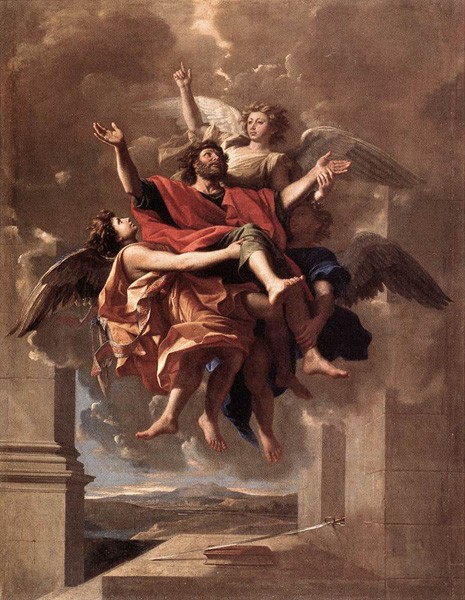

The Church offers to our consideration, during this week of Sexagesima, the history of Noah and the Deluge. Man has not profited by the warnings already given him. God is obliged to punish him once more, and by a terrible chastisement. There is found out of the whole human race one just man; God makes a covenant with him, and with us through him. But before He draws up this new alliance, He would show that He is the Sovereign Master, and that man and the earth whereon he lives subsist solely by his power and permission.
And when God had seen that the earth was corrupted (for all flesh had corrupted its way upon the earth), He said to Noah: The end of all flesh is come before Me; the earth is filled with iniquity through them, and I will destroy them with the earth (Gen. 6). This awful chastisement of the human race by the Deluge was a fresh consequence of sin. This time however, there was found one just man; and it was through him and his family that the world was restored. Having once more mercifully renewed His covenant with His creatures, God allows the earth to be repopulated, and makes the three sons of Noah become the Fathers of the three great families of the human race.
All flesh had corrupted its way upon the earth. The terrible lesson, then, which men had received by being driven out of Paradise in the person of our first parents, had been without effect. Neither the certainty of death, when they would have to stand before the divine Judge, nor the humiliations which attend man’s first coming into this world, nor the pains and fatigues and trials which beset the whole path of life, had subdued men's hearts, or brought them into submission to that sovereign Master Whose hand lay thus heavy upon them. They had the divine promise that a Savior should be given to them, and that this Redeemer (Who was to be the Son of Her that was to crush the serpent's head), would not only bring them salvation, but would moreover reinstate them in all the happiness and honors they had lost. But even this was not enough to make them rise above the base passions of corrupt nature. The example of Adam's nine hundred years' penance, and the admonitions he could so feelingly give who had received such proofs of God's love and anger, began to lose their influence upon his children; and when he at last descended into the grave, his posterity grew more and more heedless of what they owed to their Creator. The long life, which had been granted to man in this the first age of the world, was made but a fresh means of offending Him Who gave it. When, finally, the sons of Seth took to themselves wives of the family of Cain (The sons of God seeing the daughters of men, that they were fair, took to themselves wives of all which they chose – Gen. 6: 2), the human race reached the height of wickedness, rebelled against the Lord, and made their own passions their god.
Yet, all this while, they had had granted to them the power of resisting the evil propensities of their hearts. God had offered them His grace,
whereby they were enabled to conquer pride and concupiscence. The merits of the Redeemer to come were even then present to divine justice, and the Lamb, slain,
as St. John tells us, from the beginning of the world (Apoc. 13: 8), applied the merits of His Blood to this as to every generation which existed before
the great Sacrifice was really immolated. Each individual of the human family might have been just, as Noah was, and, like him, have found favor with the Most High;
but the thought of their heart was bent upon evil, and not upon good, and the earth became peopled with enemies of God. Then it was that God repented that He made man
(Gen. 6: 6), as the Sacred Scripture forcibly expresses it. He decreed that man's life on earth should be shortened, in order that the thought of death might ever be before us.
He, moreover, resolved to destroy, by a universal deluge, the whole of this perverse generation, saving one only family. The world would thus be renewed, and man would learn
from this awful chastisement to serve and love this his sovereign Lord and God.
When we reflect upon the terrible events which happened in the first age of the world, we are lost in astonishment at the wickedness of man, and at the effrontery wherewith he sins against his God. How was it that the dread words of God, which were spoken against our first parents in Eden, could be so soon forgotten? How could the children of Adam see their father suffering and doing such endless penance, without humbling themselves and imitating this model of repentance? How was it that the promise of a Mediator, Who was to reopen the gate of Heaven for them, could be believed, and yet not awaken in their souls the desire of making themselves worthy to be His ancestors, and partakers of that grand regeneration, which He was to bring to mankind? And yet, the years which followed the death of Adam were years of crime and scandal; nay, he himself lived to see one of his own children become the murderer of a brother. But why be thus surprised at the wickedness of these our first brethren? The earth is now six thousand years old in the continued reception of divine blessings and chastisements; and are men less dull of heart, less ungrateful, less rebellious towards their Maker? For the generality of men – we mean, of those who deign to believe in the fall and chastisement of our first parents, and in the destruction of the world by the deluge – what are these great truths? Mere historical facts, which have never once inspired them with a fear of God's justice. More favored than these early generations of the human race, they know that the Messias has been sent, that God has come down upon the earth, that He has been made Man, that He has broken Satan's rule, that the way to Heaven has been made easy by the graces embodied by the Redeemer in the Sacraments: and yet, sin reigns and triumphs in the midst of Christianity.

When, therefore, holy Church reminds us of those times, wherein all flesh had corrupted its way, She is urging us to think about our own conversion. Her motive in relating to us the history of the sins committed at the beginning of the world is to induce us to examine our own consciences. Why, too, does She read to us those pages of sacred Scripture, which so vividly describe the flood-gates of the heavens opening and deluging the guilty earth, if not that She would warn us against mocking that great God, Who thus chastised the sins of His rebellious creatures? Last week we were called upon to consider the sad consequences of Adam's sin, a sin which we ourselves did not commit, but the effects of which lie so heavy upon us. This week we must reflect upon the sins we ourselves have committed. Though God has loaded us with favors, guided us by His light, redeemed us with His Blood, and strengthened us against all our enemies by His grace, yet have we corrupted our way, and caused our God to repent of having created us? Let us confess our wickedness, and humbly acknowledge that we owe it to the mercies of the Lord, that we have not been consumed (Lam. 3: 22).
This is the mystery of the Divine Office during the week of Sexagesima. The mystery expressed in today's Mass is of still greater importance,
and the former is but a figure of it. The earth is deluged by sin and heresy. But the word of God, the seed of life, is ever producing a new generation:
a race of men, who, like Noah, fear God. It is the word of God that produces those happy children, of whom the beloved disciple speaks, saying: They are born not of blood,
nor of the will of the flesh, nor of the will of man, but of God
(John 1:13). Let us endeavor to be of this family; or, if we are already numbered among its members,
let us zealously maintain our glorious position. What we have to do, during these days of Sexagesima, is to escape from the deluge of worldliness,
and take shelter in the Ark of salvation; we have to become that good soil, which yields a hundredfold from the heavenly seed. Let us flee from the wrath to come,
lest we perish with the enemies of God: let us hunger after that word of God, which converts and gives life to souls (Ps. 18).
At Rome the Station is in the Basilica of St. Paul outside the walls. It is around the tomb of the Doctor of the Gentiles, the zealous sower of the divine seed, the father by his preaching to so many nations, that the Roman Church assembles Her children on this Sunday, whereon She is about to announce to them how God spared the earth on the condition that it should be peopled with true believers and with faithful adorers of His Name.
The Introit, which is taken from Psalm 43, cries out to Our Lord for help. The human race, all but extinct after the deluge, is here represented as beseeching its Creator to bless and increase it. The Church adopts the same prayer, and asks Her Savior to multiply the children of the word, as He did in former days:
Arise, why sleepest Thou, O Lord? Arise, and cast us not off to the end. Why turnest Thou Thy face away? and forgettest our tribulation? Our belly cleaveth to the earth. Arise, O Lord, help us, and deliver us. We have heard, O God with our ears: our fathers have declared to us Thy wonders...
In the Collect, the Church expresses the confidence She puts in the prayers of the great Apostle St. Paul, that zealous sower of the divine seed, who labored more than the other Apostles in preaching the word to the Gentiles:
O God, Who seest that we place no confidence in anything we do: mercifully grant that, by the protection of the Doctor of the Gentiles, we may be defended against all adversity. Through Our Lord Jesus Christ...
 The Epistle is that admirable passage from St. Paul's Second Epistle to the Corinthians (11: 19 – 12: 9), in which the great Apostle, for the honor and
interest of his sacred ministry, is necessitated to write his defense against the calumnies of his enemies. We learn from this his apology, what labors the Apostles had to go
through in order to sow the word of God in the barren soil of the Gentile world and make it Christian. We also learn of the greatness of the revelations granted to St. Paul
during his life. It closes with an attestation that even this great Apostle needed the grace of God to overcome temptation:
The Epistle is that admirable passage from St. Paul's Second Epistle to the Corinthians (11: 19 – 12: 9), in which the great Apostle, for the honor and
interest of his sacred ministry, is necessitated to write his defense against the calumnies of his enemies. We learn from this his apology, what labors the Apostles had to go
through in order to sow the word of God in the barren soil of the Gentile world and make it Christian. We also learn of the greatness of the revelations granted to St. Paul
during his life. It closes with an attestation that even this great Apostle needed the grace of God to overcome temptation:
Lest the greatness of the revelations should puff me up, there was given me a thorn for the flesh, a messenger of Satan, to buffet me. Concerning this I thrice
besought the Lord that it might leave me. And He said to me, My grace is sufficient for thee, for strength is made perfect in weakness.
Gladly therefore I will glory
in my infirmities, that the strength of Christ may dwell in me.
In the Gradual from Psalm 82, the Church beseeches Her Lord to give Her strength against those who oppose the mission He has entrusted to Her, of gaining for Him a new people, adorers of His sovereign Majesty:
Let the Gentiles know that God is Thy name: Thou alone art the Most High over all the earth. O my God, make them like a wheel, and as stubble before the wind.
Whilst the earth is being moved, and is suffering those terrible revolutions which, deluge-like, come first on one nation and then on another, the Church prays for Her faithful children, in order that they may be spared, for they are the elect, and the hope of the world. It is thus She prays in the following Tract from Psalm 59, which precedes the Gospel of the word:
Thou hast moved the earth, O Lord, and hast troubled it. Heal the breaches thereof, for it is moved. That they may flee from before the bow: that Thy elect may be delivered.
The Gospel is the well-known parable of the sower (Luke 8: 4-15). It ends with Our Lord's own explanation:
...Now the parable is this: the seed is the word of God. And those by the wayside are they who have heard; then the devil comes and takes away the word from their heart, that they may not believe and be saved. Now those upon the rock are they who, when they have heard, receive the word with joy; and these have no root, but believe for a while, and in time of temptation fall away. And that which fell among thorns, these are they who have heard, and as they go their way are choked by the cares and riches and pleasures of life, and their fruit does not ripen. But that upon good ground, these are they who, with a right and good heart, having heard the word, hold it fast, and bear fruit in patience.
St. Gregory the Great justly remarks, that this parable needs no explanation, since eternal Wisdom Himself has told us its meaning. All that we have to do, is to profit by this divine teaching, and become the good soil, wherein the heavenly seed may yield a rich harvest. How often have we, hitherto, allowed it to be trampled on by them that passed by, or to be torn up by the birds of the air! How often has it found our heart like a stone, that could give no moisture, or like a thorn plot, that could only choke! We listened to the word of God; we took pleasure in hearing it; and from this we argued well for ourselves. Nay, we have often received this word with joy and eagerness. Sometimes, even, it took root within us. But, alas! something always came to stop its growth. Henceforth, it must both grow and yield fruit. The seed given to us is of such quality, that the divine Sower has a right to expect a hundred-fold. If the soil, that is, our heart, be good; if we take the trouble to prepare it, by profiting by the means afforded us by the Church; we shall have an abundant harvest to show Our Lord on that grand day, when, rising triumphant from His tomb, He will come to share with His faithful people the glory of His Resurrection.

Inspired by this hope, and full of confidence in Him Who has once more thrown this seed into this long ungrateful soil, let us sing with the Church, in Her Offertory, these beautiful words from Psalm 16: they are a prayer for holy resolution and perseverance:
Perfect Thou my goings in Thy paths; that my footsteps be not moved. O incline Thy ear unto me and hear my words. Show forth Thy wonderful mercies; Who savest them that hope in Thee, O Lord.
In the Secret, the Church prays:
May the sacrifice we have offered to Thee, O Lord, always quicken us and defend us. Through Our Lord Jesus Christ...
The visit which Our Lord makes to us in the Sacrament of His love, is the grand means whereby He gives fertility to our souls. Hence it is that the Church invites us, in the Communion antiphon from Psalm 42, to draw nigh to the altar of our God; there, our heart shall regain all the youthful fervor of its best days:
I will go up to the altar of God; to God, Who giveth joy to my youth.
This thought is finished in the Postcommunion:
Grant, we humbly beseech Thee, O almighty God, that those whom Thou refreshest with Thy Sacraments, may, by a life well pleasing to Thee, worthily serve Thee. Through Our Lord Jesus Christ...
NEW: Alphabetical Index
Contact us: smr@salvemariaregina.info
Visit also: www.marienfried.com